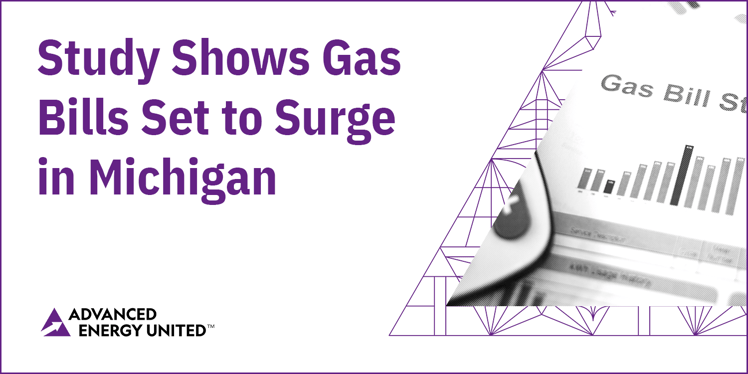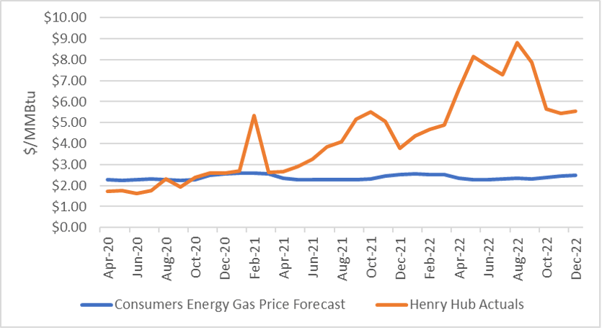Everyone deserves access to home heating that doesn’t burn a hole in their pockets. Yet, a recent study by Strategen conducted for Advanced Energy United sounds the alarm for Consumers Energy customers in Michigan. Monthly home heating bills, an already significant burden for many, are forecasted to rise — from an average of $75 in 2021 to between $114 and $131 in 2030.
This projection is based on Consumers Energy’s own planned investments of more than $700 million annually in their gas distribution system, as well as modest assumptions about energy efficiency and electrification trends as customers voluntarily respond to Inflation Reduction Act Incentives and Michigan utilities comply with Michigan’s recently updated landmark Energy Waste Reduction law.
To justify their infrastructure spending, Consumers Energy relied on an assumption of low natural gas prices through 2040. However, history reminds us that gas prices can be as unpredictable as the weather, and Consumers Energy's forecasts have been wrong before (fig. 7).
If gas prices return to their 2008 highs – neither unprecedented nor unlikely given the price volatility of the increasingly globalized gas commodity market that we’ve seen over the last several years – monthly bills could exceed $143, putting even more financial strain on Michigan households.
Consumers Gas Price Forecast Compared to Actual Prices
Increasing heating bills will hit lower-income families the hardest. These households already dedicate 34% of their income to energy bills – well exceeding the national affordability threshold of 6%. Such a glaring disparity underscores the urgent need to protect vulnerable communities from the escalating heating costs – essential in Michigan’s harsh winters.
Moreover, in the face of a transforming energy landscape, the assumption that new pipelines will stand the test of time is questionable. Building new pipes is akin to installing a new landline in today's smartphone era—costly and outdated. Technological advancements and market-driven adoption of energy-efficient appliances and electric heating, like ground-source heat pumps, are reshaping how we think about heating our homes. Federal tax incentives and rebates are making these clean energy solutions more accessible than ever, presenting an opportune moment for residents to transition.
Because of the adoption of clean, electric heating technologies, pouring ratepayer dollars into new gas infrastructure – built to last well over 50 years – is especially risky. Consumers’ investment decisions are predicated on the right to recoup the full cost of their gas investments from their customer base over time. Even if these pipes become under- or un-utilized, gas customers will remain on the hook to pay for stranded assets for decades to come.
Without intervention, Michigan risks entering a vicious cycle where the escalating expenses of gas utilities incentivize more and more customers to electrify, eventually forcing those least able to invest in energy-efficient electric appliances—including renters, low-income families, and seniors on fixed incomes—into a cycle of ever-increasing bills. The cycle will only be further intensified by substantial investments in gas infrastructure, which, despite growing electrification, must have their costs recovered from a diminishing customer base. This not only exacerbates affordability and energy equity issues but highlights the critical importance of choosing a future path that ensures equitable access to affordable heating solutions.
Michigan stands at an inflection point. The question isn't just about managing rising costs but about reimagining our energy infrastructure for the 21st century. By embracing thoughtful planning and regulatory and technological innovation, Michigan will be better poised to navigate this transition and ensure a heating future that is both reliable and affordable.
To delve into these issues further, we invite you to attend Advanced Energy United’s upcoming webinar, 'Preparing States for the Evolution of Home Heating Technologies,' on Thursday, February 29, at 11:00 AM ET. This virtual event will focus on the transition to electric heating technologies and the implications for utility infrastructure and planning. Featuring Michigan and Illinois as case studies, our panel of experts will explore strategies for state policymakers to navigate the changing landscapes of natural gas and electric heating, aiming to protect consumers and encourage energy innovation. Register now to engage in this vital conversation about shaping the future of home heating in the Midwest and beyond.


